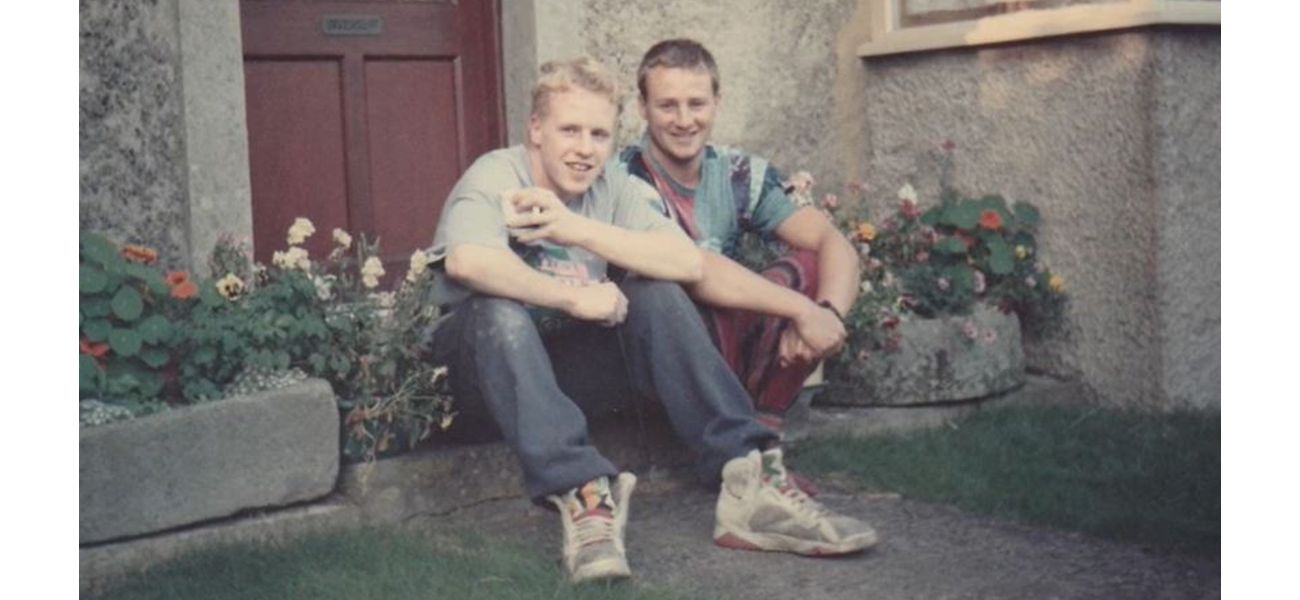A British prisoner prefers death over jail due to how unfairly he has been treated.
It was upsetting. I couldn't even recognize my own sibling.
September 15th 2024.

Rob Russell is a former RAF veteran who is currently in prison, and in a recent photograph, he is seen standing next to his older brother, Roddy. Roddy has been tirelessly advocating for his brother's release, as he has been languishing behind bars for an indefinite amount of time. This has resulted in the tragic deaths of at least 90 inmates who could not bear to stay in prison any longer. Roddy believes that it is crucial for his brother to be resentenced and released as soon as possible.
In 2009, Rob was given an IPP (Imprisonment for Public Protection) sentence with a minimum tariff of two and a half years for making a threat to kill. However, he is still in prison today, even though he has already served six times the length of his original tariff. This means that he has been behind bars for five years longer than the maximum sentence available for his offense. The IPP sentence was abolished in 2012 due to concerns about the psychological impact it has on prisoners, but it was not applied retroactively. As a result, almost 3,000 inmates, including Rob, are trapped in the system with no end in sight. Out of those, 700 have already spent 10 or more years in prison, far exceeding their original term. Some of them, like Wayne Bell and Aaron Graham, have been in prison for 17 and 19 years respectively, for offenses that would have resulted in much shorter sentences.
In an interview with Metro, Roddy shared how the IPP sentence has severely affected his brother's mental health. Rob has tried to take his own life on at least two occasions and has even asked another prisoner to strangle him. Roddy has been his brother's case worker for the past 15 years, tirelessly advocating for his release so he can return to their hometown in the Forest of Dean. It is the same place where Roddy pursued his dream career in the Royal Air Force, but it is also where Rob's nightmare began.
At the time of his arrest, Rob was struggling with alcohol addiction and had lost his job due to the breakdown of his marriage. Being unfamiliar with the criminal justice system, Roddy trusted that it would deliver justice for his brother's offense and that he would serve his two and a half year sentence and be released. However, as time passed and Rob's behavior course was terminated, his chances of being released were slim. This led him to give up hope and suffer from severe mental health issues. When Roddy visited him for the first time in prison, he was shocked to see how much his brother had deteriorated. He was disheveled, had lost weight, and seemed completely disengaged.
Over the years, Rob's mental health has continued to decline, with numerous adjudication hearings and failed Parole Board hearings. When he reached the 10-year mark in prison, he would compare himself to other inmates who had committed more serious crimes but had already been released. This further worsened his mental state. Roddy recalls a time when he visited Rob and found him looking like a prisoner from biblical times, with unkempt hair and a disheveled appearance. This was a far cry from the brother he knew.
Roddy is determined to continue fighting for his brother's release and to bring attention to the injustice of the IPP sentence. He believes that it is imperative for the government to take action before more lives are lost. He wants his brother to finally be able to come home and start rebuilding his life after spending so many years behind bars.
Rob Russell stands next to his older brother, Roddy, in a photo taken before Rob's incarceration. Roddy has been tirelessly advocating for his brother's release from prison, where he has been serving an indefinite sentence since 2009. Despite a minimum tariff of two and a half years, Rob has now been in prison for 12 years, six times longer than his original sentence. This is due to the IPP sentence he received for making a threat to kill.
The IPP sentence, which was abolished in 2012, has caused immense distress and suffering for prisoners like Rob. With nearly 3,000 inmates still trapped in the system and no end in sight, the consequences have been devastating. In fact, at least 90 inmates have taken their own lives while serving an IPP sentence.
Rob's brother, Roddy, has taken on the role of case worker and advocate for his brother's release. As an RAF veteran, Roddy understands the importance of fighting for justice and has been tirelessly campaigning for his brother's freedom. But the toll of the IPP sentence on Rob's mental health has been severe. He has attempted to take his own life on multiple occasions and once even asked another prisoner to strangle him.
Initially, Roddy trusted the criminal justice system to deliver justice for his brother, but as the years passed and Rob's sentence continued, he realized something was not right. Despite Rob's efforts to participate in rehabilitation programs and courses, he was removed from a behavior course for being "disruptive," leading to a delay in his parole hearing and ultimately, his continued incarceration.
As the years went by, Rob's mental health deteriorated significantly. He became withdrawn and stopped taking care of himself. When Roddy visited him in prison, he was shocked by his brother's appearance, describing him as looking "disheveled" and "catatonic." This was a far cry from the brother he had known before his incarceration.
Despite the challenges and setbacks, Roddy has not given up on his fight for his brother's release. He has witnessed firsthand the devastating impact that the IPP sentence has had on his brother and countless other inmates. And with each passing year, the toll only grows heavier. Rob has now been in prison for 12 years, and there is still no end in sight. This is the harsh reality of the IPP sentence – a sentence that has caused immeasurable pain and suffering for both prisoners and their families. It is time for the government to take action and bring an end to this injustice.
In 2009, Rob was given an IPP (Imprisonment for Public Protection) sentence with a minimum tariff of two and a half years for making a threat to kill. However, he is still in prison today, even though he has already served six times the length of his original tariff. This means that he has been behind bars for five years longer than the maximum sentence available for his offense. The IPP sentence was abolished in 2012 due to concerns about the psychological impact it has on prisoners, but it was not applied retroactively. As a result, almost 3,000 inmates, including Rob, are trapped in the system with no end in sight. Out of those, 700 have already spent 10 or more years in prison, far exceeding their original term. Some of them, like Wayne Bell and Aaron Graham, have been in prison for 17 and 19 years respectively, for offenses that would have resulted in much shorter sentences.
In an interview with Metro, Roddy shared how the IPP sentence has severely affected his brother's mental health. Rob has tried to take his own life on at least two occasions and has even asked another prisoner to strangle him. Roddy has been his brother's case worker for the past 15 years, tirelessly advocating for his release so he can return to their hometown in the Forest of Dean. It is the same place where Roddy pursued his dream career in the Royal Air Force, but it is also where Rob's nightmare began.
At the time of his arrest, Rob was struggling with alcohol addiction and had lost his job due to the breakdown of his marriage. Being unfamiliar with the criminal justice system, Roddy trusted that it would deliver justice for his brother's offense and that he would serve his two and a half year sentence and be released. However, as time passed and Rob's behavior course was terminated, his chances of being released were slim. This led him to give up hope and suffer from severe mental health issues. When Roddy visited him for the first time in prison, he was shocked to see how much his brother had deteriorated. He was disheveled, had lost weight, and seemed completely disengaged.
Over the years, Rob's mental health has continued to decline, with numerous adjudication hearings and failed Parole Board hearings. When he reached the 10-year mark in prison, he would compare himself to other inmates who had committed more serious crimes but had already been released. This further worsened his mental state. Roddy recalls a time when he visited Rob and found him looking like a prisoner from biblical times, with unkempt hair and a disheveled appearance. This was a far cry from the brother he knew.
Roddy is determined to continue fighting for his brother's release and to bring attention to the injustice of the IPP sentence. He believes that it is imperative for the government to take action before more lives are lost. He wants his brother to finally be able to come home and start rebuilding his life after spending so many years behind bars.
Rob Russell stands next to his older brother, Roddy, in a photo taken before Rob's incarceration. Roddy has been tirelessly advocating for his brother's release from prison, where he has been serving an indefinite sentence since 2009. Despite a minimum tariff of two and a half years, Rob has now been in prison for 12 years, six times longer than his original sentence. This is due to the IPP sentence he received for making a threat to kill.
The IPP sentence, which was abolished in 2012, has caused immense distress and suffering for prisoners like Rob. With nearly 3,000 inmates still trapped in the system and no end in sight, the consequences have been devastating. In fact, at least 90 inmates have taken their own lives while serving an IPP sentence.
Rob's brother, Roddy, has taken on the role of case worker and advocate for his brother's release. As an RAF veteran, Roddy understands the importance of fighting for justice and has been tirelessly campaigning for his brother's freedom. But the toll of the IPP sentence on Rob's mental health has been severe. He has attempted to take his own life on multiple occasions and once even asked another prisoner to strangle him.
Initially, Roddy trusted the criminal justice system to deliver justice for his brother, but as the years passed and Rob's sentence continued, he realized something was not right. Despite Rob's efforts to participate in rehabilitation programs and courses, he was removed from a behavior course for being "disruptive," leading to a delay in his parole hearing and ultimately, his continued incarceration.
As the years went by, Rob's mental health deteriorated significantly. He became withdrawn and stopped taking care of himself. When Roddy visited him in prison, he was shocked by his brother's appearance, describing him as looking "disheveled" and "catatonic." This was a far cry from the brother he had known before his incarceration.
Despite the challenges and setbacks, Roddy has not given up on his fight for his brother's release. He has witnessed firsthand the devastating impact that the IPP sentence has had on his brother and countless other inmates. And with each passing year, the toll only grows heavier. Rob has now been in prison for 12 years, and there is still no end in sight. This is the harsh reality of the IPP sentence – a sentence that has caused immeasurable pain and suffering for both prisoners and their families. It is time for the government to take action and bring an end to this injustice.
[This article has been trending online recently and has been generated with AI. Your feed is customized.]
[Generative AI is experimental.]
0
0
Submit Comment





